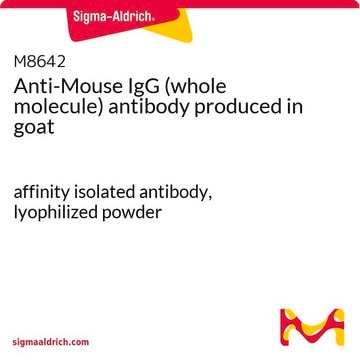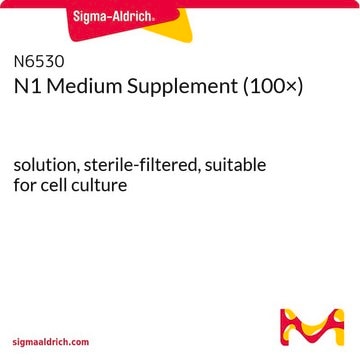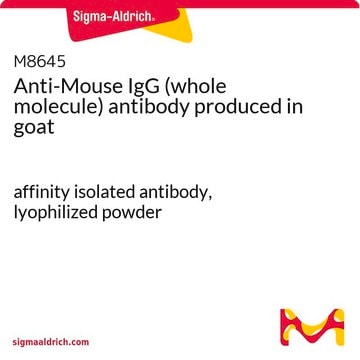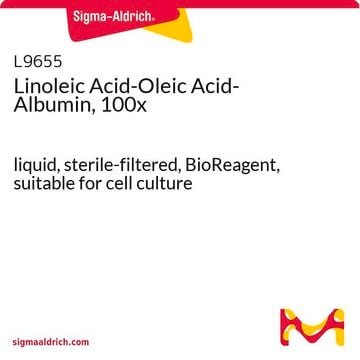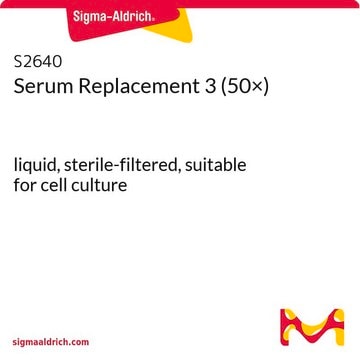S4920
SITE Liquid Media Supplement (100×)
liquid, sterile-filtered, BioReagent, suitable for cell culture
Synonyme(s) :
Media supplement
Se connecterpour consulter vos tarifs contractuels et ceux de votre entreprise/organisme
About This Item
Code UNSPSC :
12352205
Nomenclature NACRES :
NA.75
Produits recommandés
Stérilité
sterile-filtered
Gamme de produits
BioReagent
Forme
liquid
Technique(s)
cell culture | mammalian: suitable
Impuretés
endotoxin, tested
Conditions d'expédition
ambient
Température de stockage
2-8°C
Description générale
SITE Liquid Media Supplement (100×) serves as a substitute for serum-free formulations. It contains purified factors required for in vitro growth and differentiation studies. The addition of supplements to media will vary, depending on the cell type being studied and the basal medium employed. It is a general cell supplement designed for use in non-complex media (e.g., minimum essential medium (MEM), Roswell Park Memorial Institute Medium (RPMI-1640)) and complex media (e.g., Ham′s F-12, Dulbecco′s Modified Eagle Medium (DME) /F-12, MEM) with sodium pyruvate.
Application
SITE Liquid Media Supplement (100×) has been used:
- in the 3D culture of mouse embryonic pancreatic epithelial cells
- to isolate rabbit gastric glands and parietal cells
- to isolate rabbit single proximal tubule cells
Actions biochimiques/physiologiques
- Insulin: a polypeptide hormone that promotes the uptake of glucose and amino acids and may owe an observed mitogenic effect to this property.
- Transferrin: an iron-transport protein. Iron is an essential trace element but can be toxic in its free form. To nourish cells in culture, iron is supplied bound to transferrin in serum.
- Selenium: an essential trace element normally provided by serum.
- Ethanolamine: plays a significant role in the proliferation of hybridoma cells and frequently is added to supplements used for culturing these cells.
Composants
Contains 1.0mg/ml recombinant human insulin, 0.55mg/ml human transferrin (substantially iron-free), 0.5μg/ml sodium selenite and 0.2mg/ml ethanolamine at the 100x concentration.
Notes préparatoires
Prepared in Earle′s Balanced Salt Solution (EBSS) without phenol red.
Code de la classe de stockage
12 - Non Combustible Liquids
Classe de danger pour l'eau (WGK)
WGK 1
Point d'éclair (°F)
Not applicable
Point d'éclair (°C)
Not applicable
Certificats d'analyse (COA)
Recherchez un Certificats d'analyse (COA) en saisissant le numéro de lot du produit. Les numéros de lot figurent sur l'étiquette du produit après les mots "Lot" ou "Batch".
Déjà en possession de ce produit ?
Retrouvez la documentation relative aux produits que vous avez récemment achetés dans la Bibliothèque de documents.
Les clients ont également consulté
H Murakami et al.
Proceedings of the National Academy of Sciences of the United States of America, 79(4), 1158-1162 (1982-02-01)
A serum-free medium supplemented with a few growth factors was devised to grow lymphocyte hybridomas. The medium was developed with the hybridoma line MPC11-BL, a fusion product between a mouse plasmacytoma cell line (MPC11TG70na3) and mouse (BALB/c) spleen cells. In
Rawan Eid et al.
Biochimica et biophysica acta. Molecular cell research, 1864(2), 399-430 (2016-12-13)
Iron is an essential micronutrient that is problematic for biological systems since it is toxic as it generates free radicals by interconverting between ferrous (Fe2+) and ferric (Fe3+) forms. Additionally, even though iron is abundant, it is largely insoluble so
Lixin Zhu et al.
American journal of physiology. Cell physiology, 293(3), C874-C884 (2007-06-08)
In its dormant state, the membrane cytoskeletal linker protein ezrin takes on a NH(2) terminal-to-COOH terminal (N-C) binding conformation. In vitro evidence suggests that eliminating the N-C binding conformation by Thr(567) phosphorylation leads to ezrin activation. Here, we found for
Lixin Zhu et al.
American journal of physiology. Cell physiology, 295(1), C192-C202 (2008-05-16)
In a comparison of three different tissues, the membrane cytoskeleton linker protein ezrin was found to assume high levels of phosphorylation on threonine-567 (T567) in the brush border membranes of renal proximal tubule cells and small intestine enterocytes, in contrast
Mostafa Bakhti et al.
Molecular metabolism, 30, 16-29 (2019-11-27)
Translation of basic research from bench-to-bedside relies on a better understanding of similarities and differences between mouse and human cell biology, tissue formation, and organogenesis. Thus, establishing ex vivo modeling systems of mouse and human pancreas development will help not only
Notre équipe de scientifiques dispose d'une expérience dans tous les secteurs de la recherche, notamment en sciences de la vie, science des matériaux, synthèse chimique, chromatographie, analyse et dans de nombreux autres domaines..
Contacter notre Service technique
